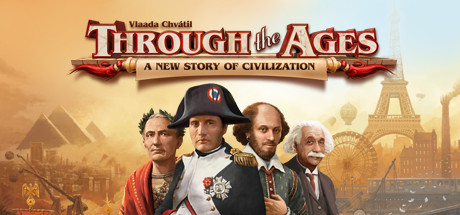Rule your people from their humble beginning as a primitive tribe to an advanced nation in this civilization-building strategy title, flawlessly adapted from the popular tabletop game to the PC.
Type: Single-player, Multi-player
Genre: Strategy, Card Game,
Board Game
Developer: CGE Digital
Publisher: CGE Digital
Release date: 26 March, 2018


Intro
I’ve been a fan of civilization-building games for as long as I can remember. Whether they have a basis in history or they’re built from the ground up in fantasy, I can’t get enough of them and I’m always looking for more. Through the Ages caught my attention when I discovered it, and it gave me vibes of the popular Civilization franchise of computer games that I’ve put far, far too many hours into over the course of my life. I decided to give it a shot in the hopes that it would be a thematically similar game that offered a familiar, but new, experience. It succeeded in that, and I’m sure I’ll be returning for the occasional game in the future even if it didn’t quite blow me away like I’d been hoping.
Through the Ages captures a thematic feel reminiscent of Civilization, though as you might imagine from its tabletop origin, it’s a more casual experience. You’ll be leading a civilization from its early stages to modern greatness by managing its resource production and consumption, researching new technologies, engaging in hostile actions like war, and so on. The big difference here is that your civilization is a concept; everything is represented by cards and tokens, and there isn’t an actual map for you to observe your progress on. The game is fairly complex for a board game and may take some time to get the hang of, though the tutorial is one of the better ones that I’ve come across, and there’s nothing that the in-game rule book doesn’t answer.
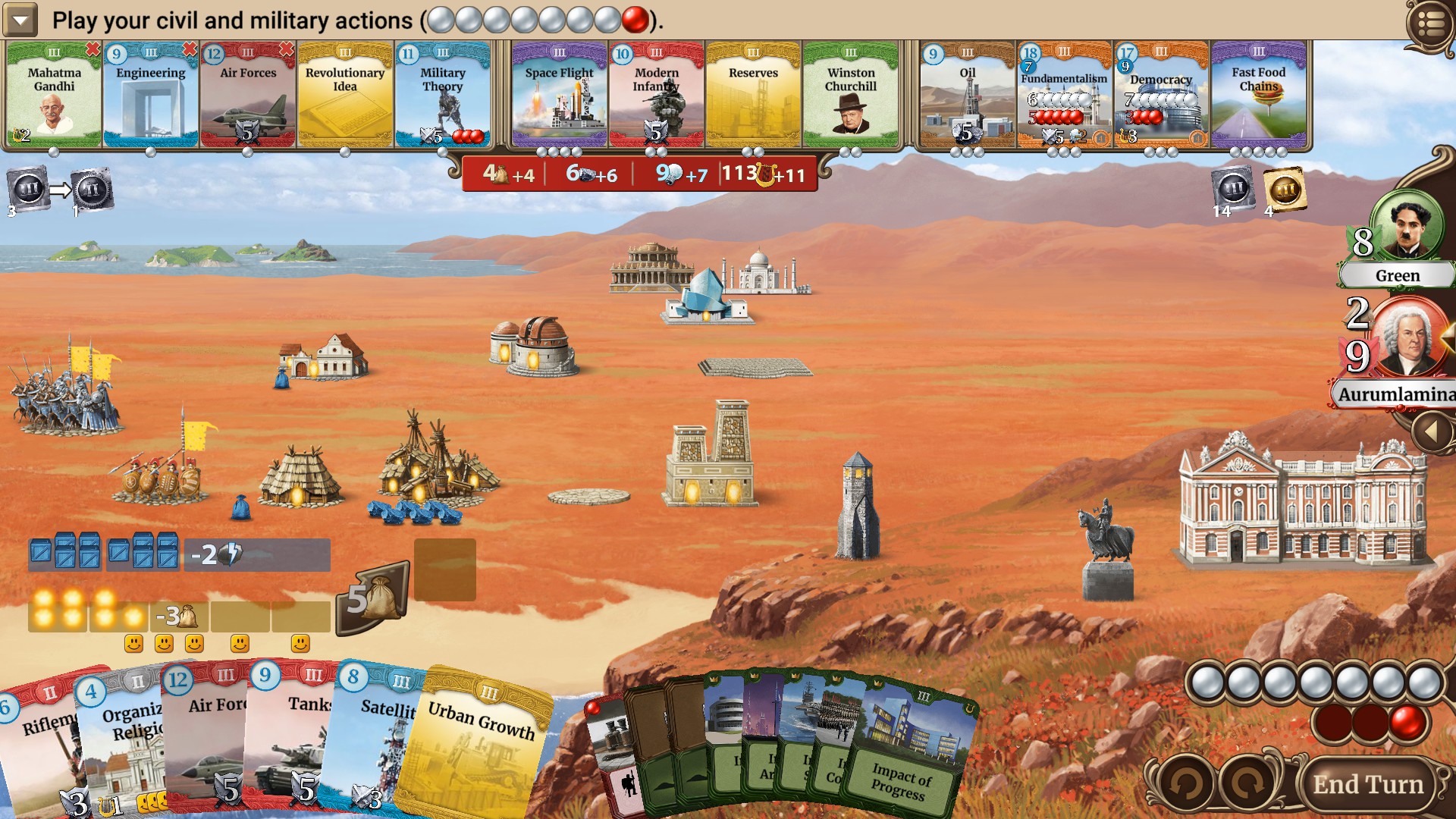
Deck-Based History
The deck is divided into a number of categories that populate each age, and players compete for these as they are drawn and placed onto the card row. You’ll spend at least one of your actions to take a card from this row and add it to your hand, though further resources and actions may be required to fully activate it. Each round, new cards are added to the row, reducing the action cost requirement to acquire those that were previously there, while removing the oldest ones from the game entirely. Once an entire age deck has been depleted in this way, the next age begins, and more modern, powerful cards begin to trickle in.
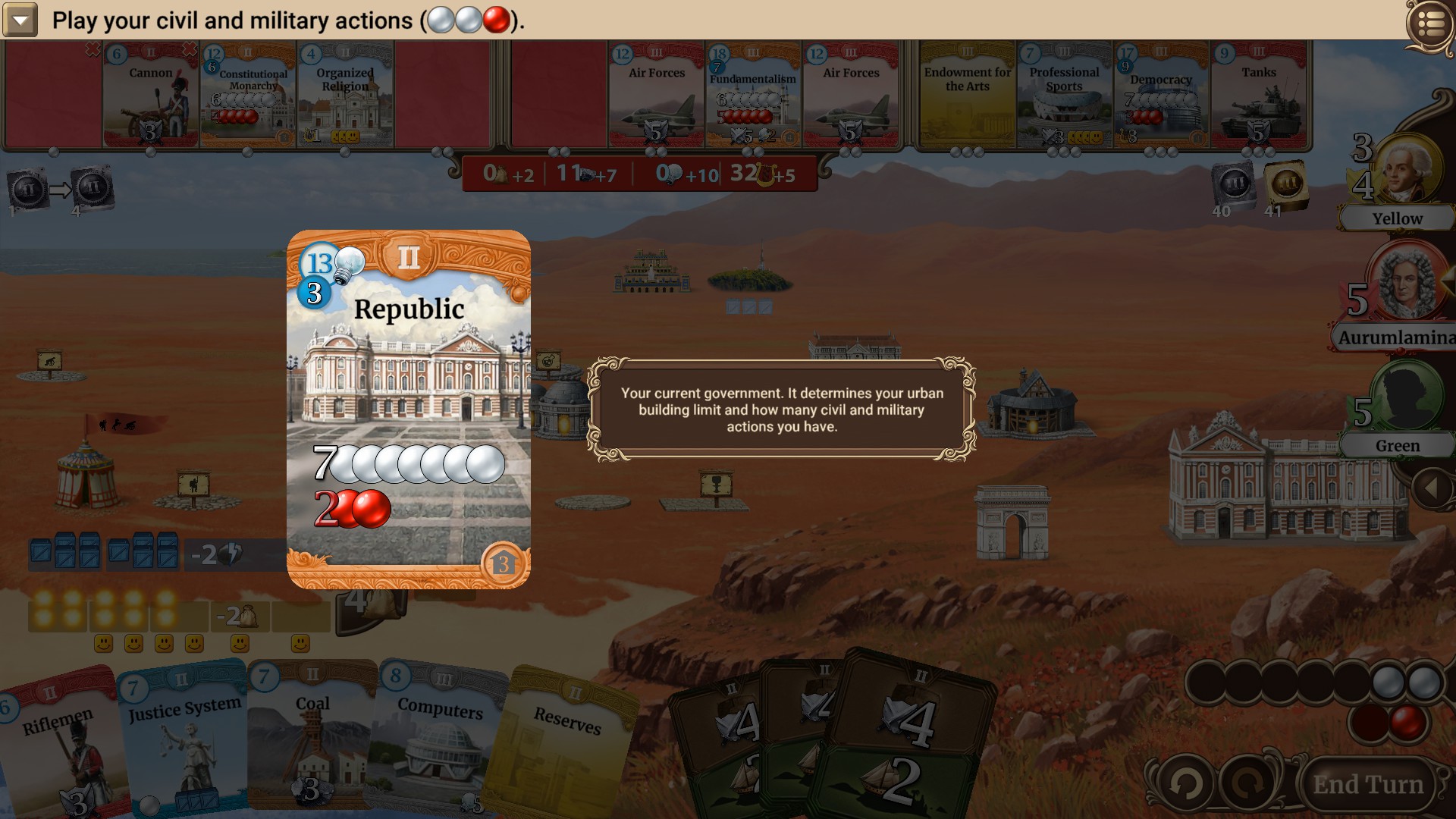
Cards come in a variety of flavors: action, leader, leader, military, technology, and wonder. Actions only cost what it took for you to purchase them from the card row. They offer an immediate benefit, such as reducing the cost of upgrading a mine or simply granting you a one-time bonus of resources for free. Leaders allow you to appoint legendary figures from history as the leader of your civilization, and they tend to bring powerful bonuses and special abilities based upon their historic accomplishments (nice touch to see Sid Meier in there!). Leonardo da Vinci, for example, offers a science boost to your highest tier science building, while also giving a free productive resource each time that you acquire a new technology. Leaders are powerful, but you’ll have to choose wisely as you can only select one from each era. Military cards tend to offer new units (such as swordsman or tanks), and tactics (bonus strength added for having a specific composition in your military), that improve your strength rating, making it more effective when push comes to shove and you find yourself going head-to-head with another player. Technologies require that you spend science to activate them, and these expand your overall capabilities by unlocking new options for further development, such as mines that provide twice the production power per population assigned than their predecessors had. Finally, there’s a little stretch from the Civilization franchise to Through the Ages with wonder cards as they take several actions and significant resources to get up and running, and once they are, they offer powerful and unique bonuses that can give you a real edge.
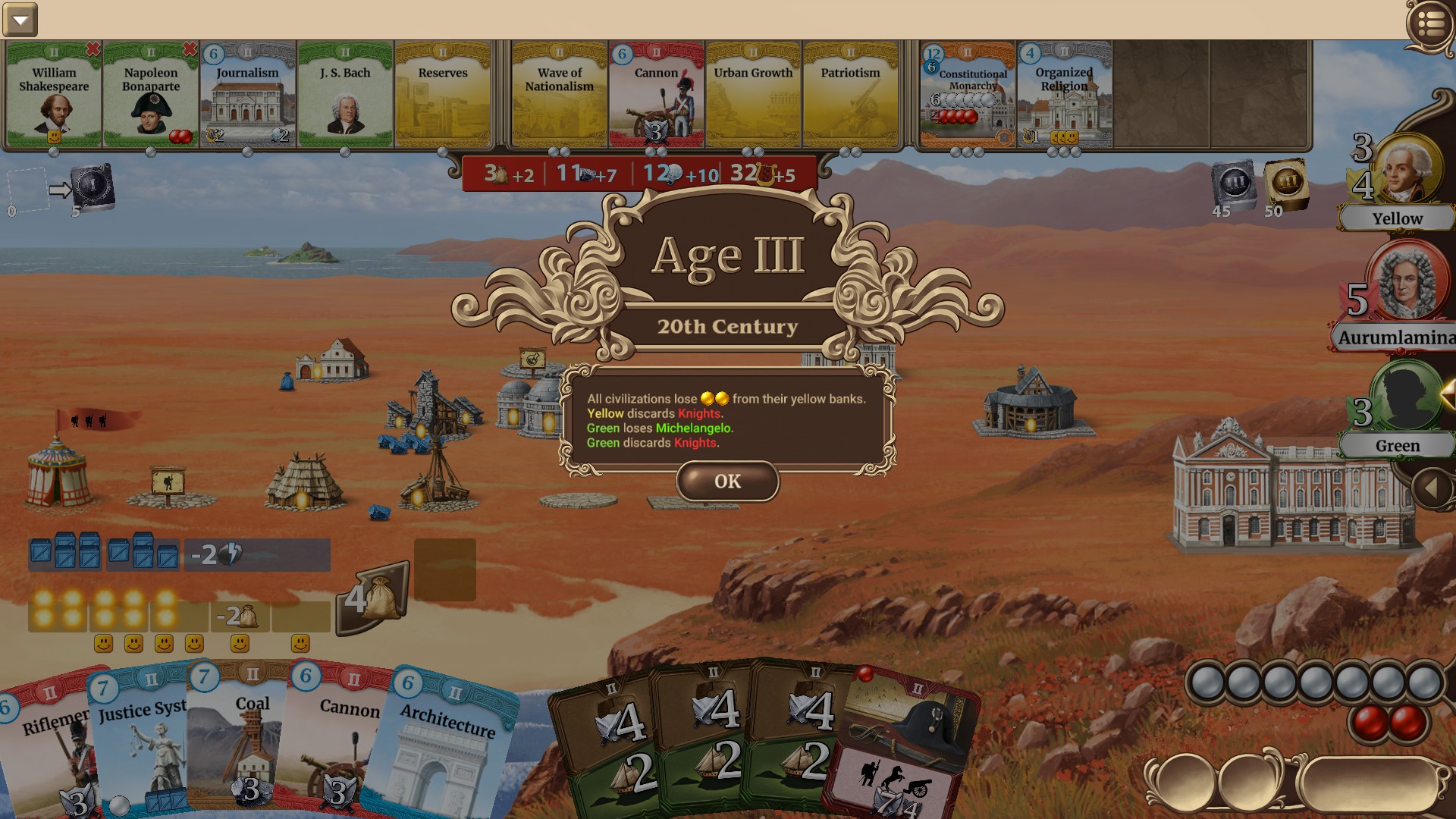
Presentation and Technical Side
My time with Through the Ages was incredibly smooth. I never had to deal with any bugs, and the game worked exactly as the rule book said that it would. The art style is about what you would expect from most board games, not fantastic, but not terrible either, though I’m going to assume that if you’ve read this far into this review, you’re not here for an experience that’s going to tax your graphics card. The music is decent, and I can’t shake that it constantly reminded me of the early Age of Empires games. If you found those acceptable, I don’t see why you would have any issue with this soundtrack.
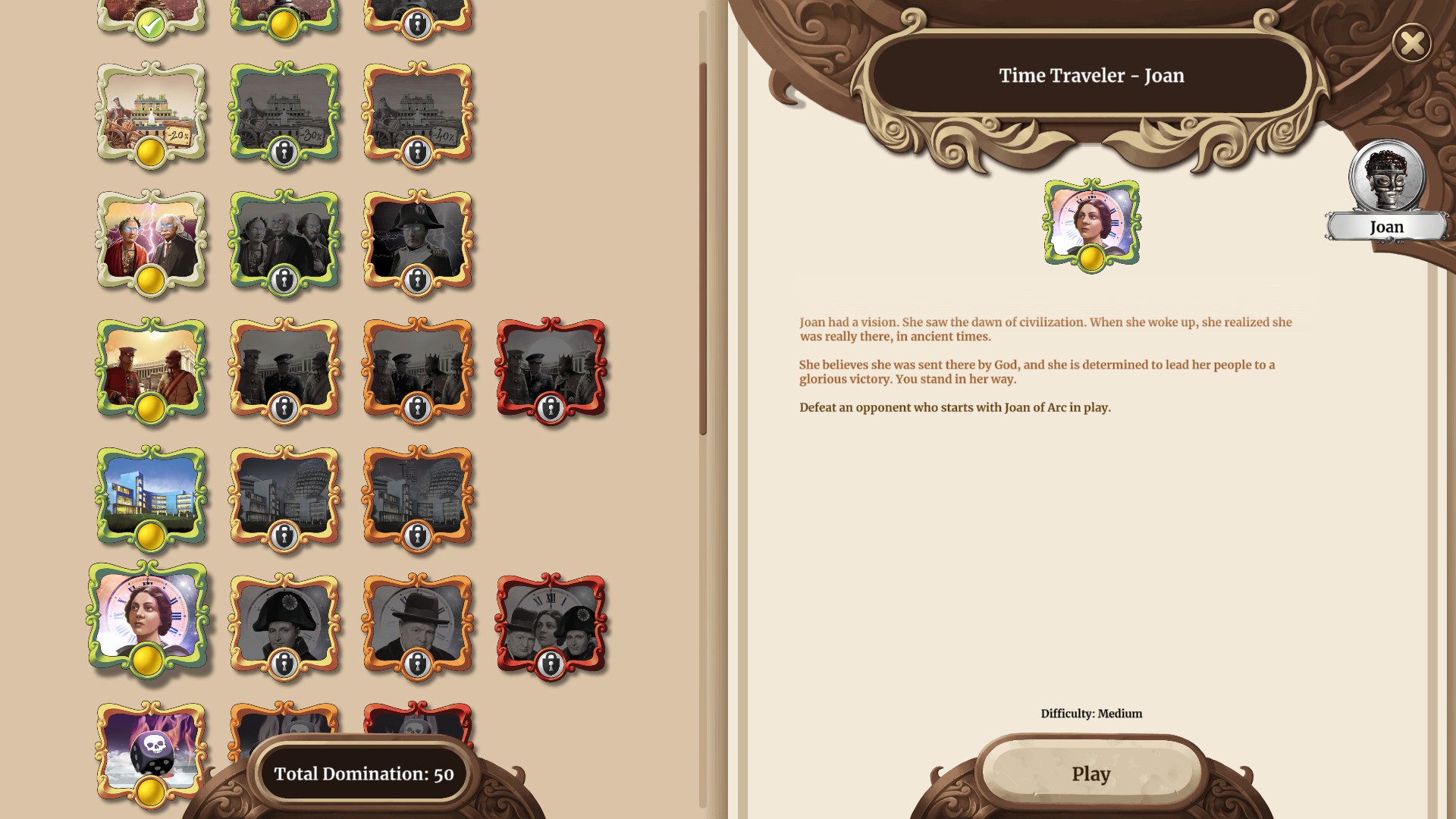
Verdict
Through the Ages does what it is supposed to do as a digital adaptation of a board game. Its gameplay is solid, the art and sound add to the experience instead of cheapening it, and the AI offers an actual challenge, which isn’t always the case in these games. It’s an all-around skillfully designed game that I would suggest that any strategy gamer could enjoy.
The real question that runs through my mind, though, isn’t whether or not it’s worth its price, but whether or not it’s worth the time that you could be putting into your favorite historical civilization-builders instead. I found that I enjoyed Through the Ages, but it didn’t offer me the same level of thrill as Civilization VI, its primary thematic competitor now that it’s arrived on PC. The limited number of ages in the game (the Middle Ages, the Age of Exploration, and the Modern Era being the only ones of any note) and its much shorter length never let you build anything truly memorable even if the game mechanics are flawlessly adapted. If you’re looking for a great digital adaptation of a popular and successful tabletop board game, Through the Ages will certainly give you that, with a smart AI to play against if you so choose. If you’re looking for a board game that offers a lot of playtime per game where you’ll be developing a legacy of your own, particularly if you want it to be a vastly different experience each time, you’ll find this title lacking.

